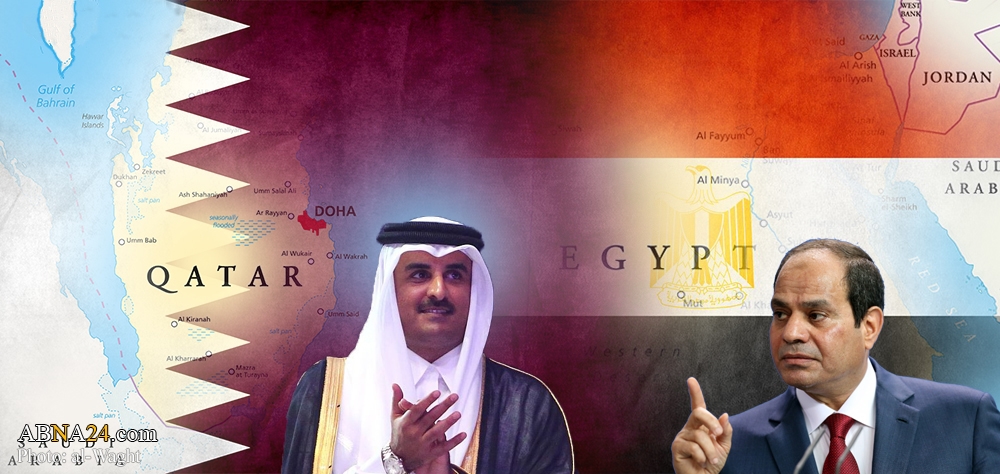AhlulBayt News Agency (ABNA): Only a few weeks after the (Persian) Gulf Cooperation Council reconciliation, which ended the years-long blockade imposed on Qatar by Saudi Arabia, the UAE, Egypt, and Bahrain, the conditions are changing and the de-escalation efforts are experiencing chill.
Following the absence of the Bahraini king from the Alula meeting in Saudi Arabia where the détente agreement was signed, as well as the UAE's cold reception of de-escalation with Qatar, media are now reporting a new round of tensions in Egyptian-Qatari relations. The Lebanese Al-Akhbar newspaper reported that Qatar’s Emir Sheikh Tamim bin Hamad Al Thani has rejected Egypt's invitation for a Cairo visit to resolve some problems in the bilateral relations, angering the Egyptians. As a result, Cairo has launched a new media attack on the Persian Gulf emirate, accusing it of sponsoring terrorism and the Muslim Brotherhood, an Islamist political group banned in Egypt and some other Arab countries. Reports said that Egypt announced some measures including closing airspace to Qatari airlines and restricting Qatari investment.
The resumption of diplomatic relations between Egypt and Qatar, announced on January 20, initially seemed to have begun in a very positive direction. Shortly after signing the rapprochement agreement in Saudi Arabia, Qatar's state-owned real estate investment company Al-Diar held the opening ceremony of the St. Regis Hotel in Cairo. Qatari Finance Minister Ali al-Emadi, along with former US Treasury Secretary Steven Mnuchin, attended the event. The visit to Egypt was the first by a senior Qatari official since the Cooperation Council crisis in mid-2017.
Al-Emadi said the project’s inauguration ushers in Qatar's first step in more than $5 billion investments in various fields in Egypt.
Cairo also sought other financial benefits in reconciliation with Qatar. Approximately 300,000 Egyptians work in Qatar, which is an important source of foreign currency for Egypt.
On the other hand, there are factors that led Egypt to de-escalate tensions. These factors influenced the tendency to rebuild relations with Doha.
The warming of relations between Egypt and Qatar is not unrelated to Joe Biden’s assumption of power. Cairo leaders, just like the Saudi rulers, have serious concerns about the goals of the new US administration. Egyptian officials well remember that the Obama administration stopped selling weapons to Egypt after the 2013 coup. They are now worried that the new government will put strains on Egypt in the same way on human rights issues. By establishing diplomatic relations with Doha, Egypt may have sought to show its goodwill to Washington.
But the political changes in the US was not the only factor in Egypt's desire for peace with Qatar. President Abdel Fattah Al-Sisi is in a safer position today than when he took the power after overthrowing President Mohamed Morsi in 2013 or even when the Persian Gulf crisis occurred in 2017. Many Muslim Brotherhood leaders have moved from Qatar to Turkey, making détente with Doha even easier for Cairo.
However, despite these positive developments, some fundamental differences have again raised tensions between them, giving us a reason to call the rapprochement between Qatar and Egypt in the post-reconciliation environment "cold peace".
The civil war in Libya, a country where Egypt and Qatar support the opposite sides, is probably the most sensitive case. Along with Ankara, Doha supports the UN-recognized National Accord Government (GNA), while the Egyptians, besides the UAE, support the Libyan National Army (LNA), led by Caliph Haftar, in Tobruk east of the country.
Cairo is worried that the Brotherhood will consolidate its position in a country that has a long border with Egypt. In the absence of diplomatic progress to end the conflict, the Libyan crisis will remain a source of deep divisions in Doha-Cairo relations.
Beyond Libya, there are other regional issues, from the ongoing political turmoil in Tunisia to Qatar's growing influence in South Sudan, which is likely to provoke the Egyptians.
As Cairo is highly sensitive to the dispute over the Grand Ethiopian Renaissance Dam on the Nile River, it finds it necessary to work with both South Sudan and Sudan to secure its national interests in East Africa.
Cairo is unlikely to welcome Doha’s efforts to expand its role in the regional developments, particularly in support of Ethiopia. Just as Cairo saw Qatar's support for Islamist factions in Sudan as a direct threat to Egypt under President Hosni Mubarak, who was ousted in 2011 revolution, al-Sisi sees Qatar restoration of foothold in Sudan after ouster of President Omar Bashir in April 2019 posing a potential threat.
/129

